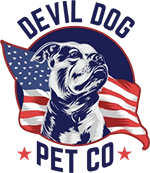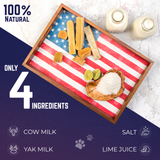Becoming a pup parent is one of the most rewarding experiences you can have. However, it comes with its challenges and responsibilities that can affect your pup's health, happiness, and overall well-being.
Practicing responsible dog ownership means understanding your pup's needs and making informed decisions about their care. Whether you're a first time puppy owner or looking for tips for new dog owners, being aware of potential mistakes can set you and your pup up for success. From choosing healthy dog food to giving proper puppy training, every decision plays a role in your dog's overall well-being.
Today, we’ll explore some of the most common pup parent mistakes and how to avoid them, helping your furry friend grow into a well-rounded and healthy dog.
Mistake 1: Improper feeding
Proper nutrition is the cornerstone of good health for your pup. Improper feeding is one of the most prevalent mistakes first time puppy owners make. This can include overfeeding, giving your pup the wrong type of food, or not adhering to a consistent feeding schedule. Overfeeding can lead to obesity, which opens the door to a host of health problems like diabetes, heart disease, and joint issues that can shorten their lifespan. Underfeeding or providing a diet lacking necessary nutrients can result in malnutrition, growth deficiencies, weakened immune systems, and other health issues. Keep in mind that feeding your pup table scraps or inappropriate human foods can lead to gastrointestinal problems and even toxicity.
Avoid improper feeding
Consult your veterinarian to determine the appropriate diet for your pup based on their age, weight, breed, and activity level. Puppies have very specific dietary needs that change as they grow, so it's crucial to follow your vet's advice. Stick to a consistent feeding schedule and avoid giving your pup table scraps or too many treats. Use measuring cups to ensure you’re providing the correct portions. Choose healthy dog food or scientific dog food that provides the necessary nutrients for growth and development. Be sure to also supplement your dog’s diet with nutritious dog chews. Following these tips for new puppy owners can help set your pup on the path to a long and healthy life.
Mistake 2: Inadequate exercise
Exercise is essential to a puppy's daily routine and overall health. Crucial for maintaining a healthy weight, burning off energy, and staying mentally sharp, exercise also helps prevent the development of undesirable behaviors due to boredom or excess energy. However, many pup parents underestimate the amount of exercise they need or are unsure of the appropriate types of activities for their dog's age, breed, and energy level. Different breeds have different exercise requirements. Active breeds like Border Collies and Labrador Retrievers need much more exercise than more sedentary breeds like Bulldogs or Basset Hounds.
How to ensure your dog gets adequate exercise
Develop a regular exercise routine that suits their needs. Young puppies may require frequent shorter puppy dog play sessions rather than long walks. For growing pups, activities like short walks, playtime, and interactive toys can make a significant difference. Taking your pup to dog parks provides both exercise and valuable socialization. As they grow, you can increase the intensity and duration of exercise. Ensure the activities are safe and age-appropriate to avoid potential injuries. Socialization through playdates with other pups can also double as exercise and help reduce dog anxiety by building confidence in different environments. Engaging in mental stimulation for dogs, such as puzzle toys or obedience training, can further enrich their exercise routine.
Mistake 3: Lack of training and socialization
Training and socializing your pup from an early age is critical for their development into a well-behaved, confident, and friendly adult dog. Training isn't just about teaching your pup tricks or commands—it's about establishing a line of communication between you and your pup, helping them understand what behavior is expected in different situations. Socialization is equally important, involving the exposure of your pup to a variety of environments, people, animals, and experiences. Without proper training and socialization, puppies may develop behavioral issues such as aggression, dog anxiety, and disobedience, which can be difficult to correct later on.
How to prevent insufficient training and socialization for your pup
Start puppy training and socializing them as early as possible. Basic dog obedience training should cover commands like sit, stay, and come. Training should be consistent and use positive reinforcement dog training techniques such as treats, praise, and play. Expose your pup gradually to different environments, people, and other animals in a controlled manner. Puppy classes or socialization groups can provide structured environments for these interactions. The goal is to make new experiences positive and manageable, reducing fear and dog anxiety. By following these training and socialization tips for new puppy owners, you can help ensure your pup grows into a well-adjusted and confident companion.
Mistake 4: Neglecting regular veterinary check-ups
Neglecting regular veterinary check-ups is a mistake that can have serious consequences for your pup's health. Regular vet visits allow for early detection of potential health issues, timely vaccinations, and essential preventative care such as parasite control and dental care. Puppies, in particular, require check-ups during their first year as they go through various stages of development and require vaccinations to protect them from common canine diseases. Skipping these visits can leave your pup vulnerable to preventable illnesses and conditions that could have been easily managed or avoided. Prioritizing routine vet care is a key aspect of responsible dog ownership and ensures your pup stays healthy and happy.
How to ensure your dog receives regular veterinary check-ups
Schedule regular veterinary check-ups at least once a year. For puppies, more visits may be necessary for vaccinations and early health checks. Keep a health record for your pup, track vaccination schedules, and be vigilant about any changes in their behavior or physical condition. Regular dental check-ups are also important as dental problems can lead to more significant health issues. Discuss a suitable vaccination and check-up schedule with your vet to keep your pup in optimal health. Following these important health tips for new dog owners will help ensure that veterinary care becomes a consistent and essential part of your pup’s routine.
Mistake 5: Ignoring mental stimulation
Just like physical exercise, mental stimulation for dogs is crucial for a pup's overall well-being. Mental engagement helps to prevent boredom and dog anxiety, reduces the risk of destructive behaviors, and supports cognitive development. A lack of mental stimulation can lead to a range of behavioral issues such as excessive barking, chewing, digging, and general restlessness. Pups are naturally curious and playful, and they thrive in environments that offer diverse and engaging activities to challenge their minds.
How to avoid neglecting your pup's mental stimulation
Provide your pup with a variety of toys and puzzles that challenge their mind. Training sessions, interactive play, and even simple games like hide-and-seek can keep your pup mentally sharp. Rotating toys and incorporating new activities can also help keep their environment engaging. Offering long lasting puppy chews, such as antler chews for dogs, yak chews, and bully sticks, provides a safe and enjoyable way to keep your pup occupied. Interactive toys such as treat-dispensing puzzles and automated fetch devices can keep your pup occupied and engaged. Creating a stimulating and enriching environment helps in developing a well-rounded and happy pup.
Mistake 6: Inconsistent rules and boundaries
Consistency is key when it comes to training and managing your pup's behavior. Inconsistency in enforcing rules and boundaries can confuse your dog and lead to poor behavior. For example, if your pup is allowed to jump on the furniture sometimes but is scolded for it at other times, they may become confused about what is expected of them. This confusion can lead to dog anxiety and stress. Clear, consistent rules and boundaries help your pup understand their place in the household and what behaviors are acceptable.
How to maintain consistent rules and boundaries for your pup
Establish clear rules and enforce them consistently. If certain behaviors are off-limits, make sure everyone in the household is on the same page and reinforcing the same boundaries. Consistency helps your pup understand what is expected of them and reduces dog anxiety and confusion. For example, if jumping on the furniture is not allowed, ensure that everyone follows this rule without exceptions. Using positive reinforcement dog training techniques, such as rewarding desired behaviors with treats like dog chews and praise, reinforces learning and supports dog obedience training for long-term behavioral success.
Extreme dog ownership: taking care to the next level
For dedicated pup parents, avoiding mistakes is just the beginning. Extreme dog ownership means going beyond the basics to provide the highest level of care, enrichment, and training. This can include creating customized diets with the best healthy dog food, engaging in advanced dog obedience training, and providing top-tier enrichment activities like mental stimulation for dogs. Ensuring your pup gets the best in every aspect of life helps them thrive physically, mentally, and emotionally. By striving for excellence in pet care, you set your pup up for a long, happy, and fulfilling life.
Avoiding these common pup parenting mistakes can significantly enhance the quality of life for your pup and make your journey as a pup parent much smoother. Remember, every pup is unique, and it’s important to tailor your care to their specific needs. By focusing on proper nutrition, regular exercise, consistent training, and routine vet visits, mental stimulation, and clear boundaries, you can create a safe, happy, and fulfilling environment for your furry friend.







